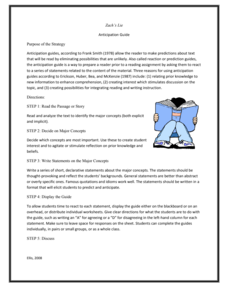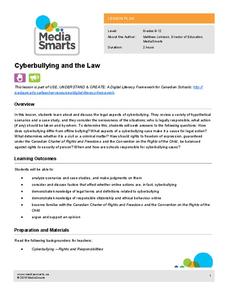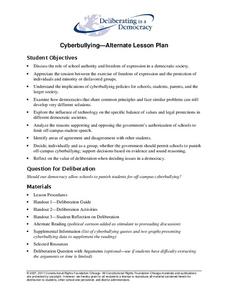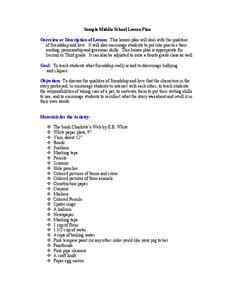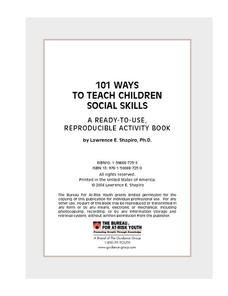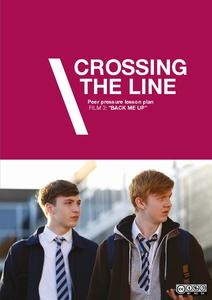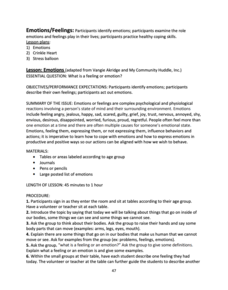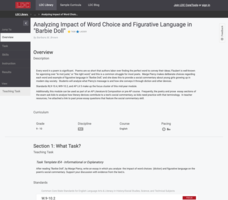Novelinks
Zach’s Lie: Anticipation Guide
The class explores the truths and lies regarding Zach's Lie through a well-written anticipation guide. First in a series of seven resources, the guide addresses themes within the text. The class collaboratively discusses their feelings...
Anti-Defamation League
“They Don’t Know Me”: Exposing the Myths and Establishing the Facts about Immigration
Middle schoolers engage in a lesson plan that teaches them to distinguish myths from facts about United States immigration. Class members take an immigration quiz, watch a "What Would You do" video, and discuss how they could be an ally...
BBC
Conflict
Middle schoolers take a close look at the different forms that bullying can take, and share their ideas of ways to stop bullying in schools. Learners get together in groups of three and come up with a scenario that depicts a conflict....
Curated OER
Freak The Mighty: KWHL Instructions for Generating Student Research
Readers of Freak the Mighty employ a KWHL strategy to explore the topics of bullying and friendship prior to reading Rodman Philbrick’s story that is “like truth serum. . . whether it really happened or not.” Research could be extended...
The Holler
Conflict Resolution
Does your class understand the importance of peaceful conflict resolution? Middle schoolers share conflict stories, then collaborate to resolve simulated conflicts during an engaging lesson. The teacher's guide contains implementation...
Museum of Disability
Taking Down Syndrome to School
Teach your class about the ways they can befriend and understand people who are different from them with a reading comprehension lesson. As youngsters read Taking Down Syndrome to School by Jenna Glatzer, they answer a series of...
Equality and Human Rights Commission
Learning area 2: Challenging Stereotypes and Discrimination
Six powerful and eyeopening lessons provide scholars with activities designed to challenge stereotypes and discrimination. The unit provides reading material with which pupils read and discuss. Grand conversations lead to physically...
Media Smarts
Cyberbullying and the Law
Research, role-playing, and reflection are the three “R’s” that form the basis of an examination of Cyberbullying. Although based on the Criminal Code of Canada, the included scenarios and case studies provide valuable resources for a...
Northwest Career & Technical Academy Foundation
Stand Up. . . Be InCtrl!
What is the difference between a bystander and an upstander? A collaborative project created through digital media helps the class understand that they can participate in an online community respectfully and responsibly. They consider...
Deliberating in a Democracy
Cyberbullying—Alternate Lesson Plan
Should schools be permitted to punish young scholars for off-campus cyberbullying? After reading a passage that details statistics about cyberbullying and Supreme Court rulings about schools' ability to limit student speech, class...
Quia
Charlotte’s Web Lesson Plan
Make your classroom into a place of kindness and compassion with E.B White's Charlotte's Web. The first four pages of the lesson plan guide you through several steps and projects, including discussions on Charlotte and Wilbur's...
Equality and Human Rights Commission
Negative Attitudes
A study in the United Kingdom found that approximately 60 percent of workers had heard the term gay used as an insult in the professional workplace. Scholars consider discrimination, negative attitudes, tolerance, and stereotypes in the...
Guidance Group
101 Ways to Teach Children Social Skills
Increasing pressure to improve student achievement has made it easy to overlook the social skills they also need to develop. With this collection of worksheets and activities, you'll be able to improve children's communication, teamwork,...
Museum of Disability
A Picture Book of Louis Braille
Teach kids about the beginnings of the Braille writing system with a lesson about Louis Braille. A series of discussion questions guide young readers though A Picture Book of Louis Braille by David A. Adler, and once they finish the...
Project B.A.S.I.C. Child Development Specialist and Child Care Consultation
Better Attitudes and Skills in Children
Little kids often have very big feelings, and need help expressing them. A set of social emotional lessons provide tangible ways for young elementary learners to visualize their emotions, focus on clear communication, and channel their...
Childnet International
Peer Pressure
What do you do if someone you like wants you to do something you don't want to do? A series of activities, including discussion, videos, role-play, and poster projects, demonstrate the most effective ways to withstand peer pressure online.
Childnet International
Self Esteem
To middle schoolers, there's nothing worse than being excluded from a peer group. Developing important self-esteem skills can not only get them through awkward adolescent times, it can carry them through the rest of their lives as...
Southern Poverty Law Center
Analyzing How Words Communicate Bias
Words are powerful ... can your class choose them wisely? Scholars evaluate news articles to discover the concepts of tone, charge, and bias during a media literacy instructional activity. The resource focuses on recognizing implicit...
Facebook
Online Presence
What happens when an online post gets the wrong kind of attention? Learners evaluate the good, the bad, and the occasionally ugly side of social media posting with a instructional activity from a vast digital citizenship series. After...
San Diego County District Attorney
Emotions/Feelings
Three lessons delve deep into the topic of feelings and the importance of expressing one's emotions. Through grand conversation, hands-on learning experiences, and reflective writing, scholars interpret the ups and downs of everyday...
Literacy Design Collaborative
Analyzing Impact of Word Choice and Figurative Language in "Barbie Doll"
After a close reading Marge Piercy's poem "Barbie Doll," class members craft an AP®-style explanatory essay in which they analyze the diction and other figurative literary devices the poet employs to deliver her commentary on modern...
Facing History and Ourselves
Speaking Up and Speaking Out
The final lesson in the Standing Up for Democracy unit offers class members a way they can stand up and speak out by crafting spoken word poetry, or Slam poetry. After analyzing several examples, individuals reflect on one positive...
Facing History and Ourselves
The Costs and Benefits of Belonging
Peer pressure and the desire for acceptance are powerful things. A thought-provoking lesson plan looks at the positive and negative effects of wanting to belong to a group. Class members examine the roles of the perpetrator, the victim,...
Facing History and Ourselves
Blending In and Standing Out
An excerpt from Sarfraz Manzoor's memoir about how his experiences as a Pakistani growing up in England shaped the way he though about his identify provides a stimulus for a discussion of how experiences can shape our concept of identity...
Other popular searches
- Bullying Worksheets
- Bullying Scenarios
- Anti Bullying
- Bullying Prevention
- Cyber Bullying
- Bullying Lesson Plans
- School Counselors Bullying
- Bullying Scenarios Role Play
- Conflict Management Bullying
- Bullying Behavior
- Anti Bullying Activity
- Anti Bullying


